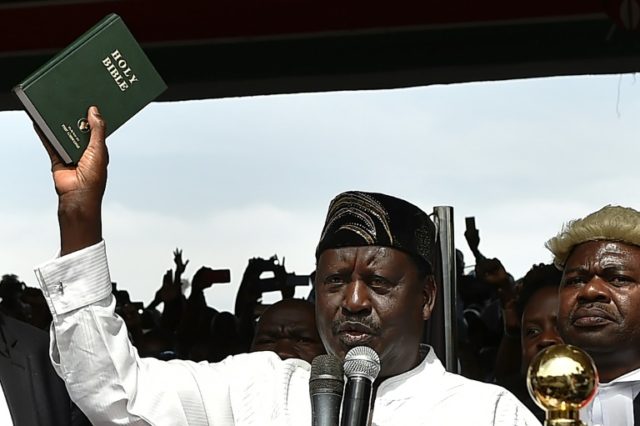The messy state of Kenyan electoral politics took another turn for the worse on Tuesday as opposition leader Raila Odinga declared himself “The People’s President” and held a mock inauguration ceremony in a Nairobi park.
The administration of the actual president of Kenya, Uhuru Kenyatta, was not amused. Three television stations broadcasting Odinga’s event were cut off, and he was accused of treason. About 2,000 Odinga supporters are said to have attended the event in person.
The U.S. government advised Odinga not to proceed with the stunt, mindful of violent unrest following the last election in August and an October do-over that did not satisfy Kenyatta critics. The Kenyan Supreme Court nullified the August election due to irregularities but refused two petitions to nullify the October vote despite a number of eyebrow-raising incidents, such as one of the election commissioners announcing her life was in danger and fleeing the country.
The opposition refused to accept Kenyatta’s ostensible 7.5 million vote victory in October. Odinga himself dropped out of the race before votes were cast, declaring the election too corrupt to participate in, and left the country for a time. He has since refused to accept the October re-vote as legitimate.
Riots after the August election produced a number of deaths. The opposition claims hundreds were killed and accuses the government of suppressing reports of the true carnage while dumping body bags into mass graves. The unrest was tribal as well as political, with members of Odinga’s tribe seeking to break the dominance of ethnic groups that have dominated the central government since the 1960s.
The U.S. State Department congratulated Kenyatta and Deputy President William Ruto on their victory after the October election was allowed to stand, but expressed deep concern about “ongoing political tensions in Kenya” and urged security forces to “refrain from the use of unnecessary force against citizens exercising their democratic rights.”
American officials met with Odinga and members of his party to warn them against proceeding with his plans for an inauguration, but they proceeded anyway, stating that Odinga was the true winner of the August election and the October re-vote was entirely invalid.
The Odinga inaugural event was not staged as satire or mockery. He took an oath of office administered by a member of parliament from his party and formally declared, “I Raila Amolo Odinga, in full realization of the high calling, assume the office of the People’s President of the Republic of Kenya.”
Odinga told reporters his inauguration represented the fulfillment of a “promise to Kenyans.” After the event at Uhuru Park in Nairobi, he changed his Twitter profile to identify himself as “His Excellency Raila Amolo Odinga, sworn in as the People’s President on 30/1/2018.”
Odinga’s tweets from Tuesday include a declaration that he is “graciously accepting the mandate granted us by the Kenyan people on August 8th” and a retweet of his National Super Alliance (NASA) Party declaring him “the legitimate President of Kenya.” He describes the Uhuru Park event as a “big day” for the nation.
I wish to thank the people of Kenya for the mandate they have given us and for their steadfast confidence in us. You came from all corners of the republic to witness my inauguration and it was good to see you out in millions. pic.twitter.com/U7oCAhsHPI
— Raila Odinga (@RailaOdinga) January 30, 2018
The Kenyan opposition released results from the August vote it claimed were “authentic” that showed Odinga the winner but did not explain how it was able to obtain the data. The Kenyan electoral commission disputed the opposition’s claims and said their data was faked.
Kenya’s Attorney General Githu Muigai declared in December that swearing in an alternative president would constitute an act of treason for everyone “facilitating the process,” without naming Odinga specifically. Treason is punishable by death under Kenyan law.
Muigai also said that parallel national assemblies like the one promoted by Odinga’s NASA Party are “unconstitutional, they are illegal, they are null and void.”
“The persons involved in their creation are involved in extra-constitutional activity and may be visited by the full force of the law,” he warned.
Analyst William Atwell of the Frontier Strategy Group told CNBC that Odinga is not seriously attempting to stage a coup, but rather seeks to “remain relevant, gain media attention, and remain in the public eye.”
“He’s worried that after successive failed attempts to win the presidency, his political capital is running out,” Atwell said. Odinga is 73 years old and made his first official run at the presidency in 1997, although the BBC notes he was imprisoned in 1982 for plotting a coup attempt. His nemesis President Uhuru Kenyatta is the son of the Republic of Kenya’s first president, Jomo Kenyatta.

COMMENTS
Please let us know if you're having issues with commenting.